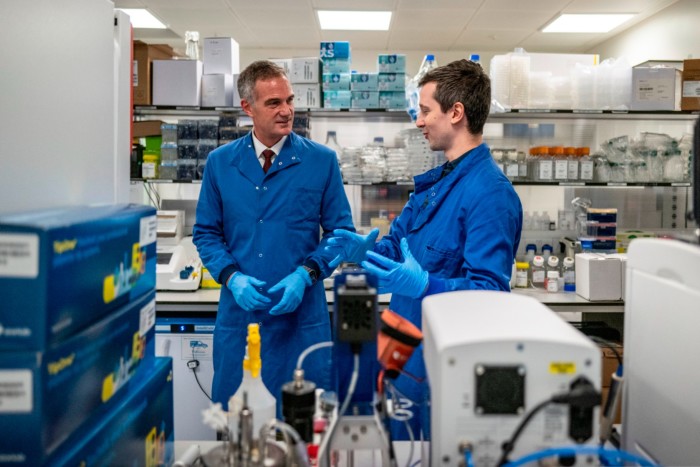UK launches regulator in push to speed up approvals for new technology

Unlock the Editor’s Digest for free
Roula Khalaf, Editor of the FT, selects her favourite stories in this weekly newsletter.
The UK government has launched a Regulatory Innovation Office aimed at helping speed up approvals for new technologies in fields such as biotechnology and autonomous vehicles.
Science secretary Peter Kyle said the new body in the Department for Science, Innovation and Technology would take innovation in areas including space, self-driving cars and lab-grown meats “by the scruff of its neck” and drive them through the regulatory process.
“I’m sure there will be a bit of kicking and screaming, but if we get this right, we could be the seed that starts to change the culture of regulation in our country,” he told the Financial Times.
But investors and industry experts in novel foods warned that in order to be effective, RIO would need to be matched with substantial new investment in the UK’s under-resourced regulators in the Budget and next Spending Review.
Since Britain took back responsibility for regulation from Brussels after leaving the EU, its regulators have been forced to take on significant extra work in areas such as medical devices, food safety and artificial intelligence.
The National Audit Office, the public spending watchdog, has reported on the difficulties faced by regulators, such as the Food Standards Agency (FSA) and the Health and Safety Executive, in recruiting new staff to meet their expanded post-Brexit roles.
In its election manifesto, Labour said RIO would help co-ordinate the UK’s regulatory landscape, “update regulation, speed up approval timelines and co-ordinate issues that span existing boundaries”.

On a visit to inspect start-ups at the Translation & Innovation Hub at Imperial College London, Kyle said RIO would initially concentrate on four key areas: autonomous vehicles; digital healthcare; space; and biotechnology, including pest-resistant crops and cultivated meats.
The remit has seemingly narrowed from before the election, when Tulip Siddiq, now City minister, said RIO would “promote innovation in regulation across sectors”. Kyle said financial services would potentially be “in scope” as RIO’s remit expanded.
The government said on Monday it had started the search for someone to act as RIO chair but gave no details of its future budget or staffing levels.
Kyle said the body was likely to win more funding and staff if it proved to be effective in driving growth. He added: “The Budget is coming up and Spending Review is going to be in spring; these will address the fundamental and underlying funding settlements for all areas of the public sector.”
Investors and industry experts in novel foods welcomed the announcement of RIO alongside £1.6mn for a “sandbox” at the FSA as a test bed in which to explore how to better regulate novel food technologies.
Businesses in the sector have complained about a lack of resources at the FSA, saying it is much harder to deal with than rival agencies in the US and Singapore.
Cai Linton, co-founder and chief executive of Multus Biotechnology, which develops nutrients for the lab-grown meat industry, told Kyle on the visit that “companies have failed” because of regulators taking too long to grant approvals.
“US or Singapore regulators will talk you through the regulatory process, tell you what data they will need. With the FSA, they say: ‘We can’t give you answers until you submit a full dossier.’ That can kill a company,” he said.
Ed Steele, founder of Hoxton Farms, a start-up making lab-grown animal fat that has previously criticised the FSA, welcomed the new sandbox. “It’s a big sign of intent and I hope is the start of regulatory reform,” he said.
Andrew Bennett, policy lead at Form Ventures, a venture capital fund specialising in start-ups in areas with novel regulations, also welcomed both RIO and the FSA sandbox as “much-needed institutions” to support growth.
But he warned that they would need support, adding: “It’s critical RIO doesn’t just become merely the next well-intentioned regulatory initiative to fall short; it must be backed — politically in DSIT and financially by the Treasury — to deliver a genuine step-change in urgency and outcomes.”
Linus Pardoe, UK policy manager at the Good Food Institute Europe, said the FSA sandbox sent “a clear message” on the government’s commitment to monetising innovation, but added the regulator still required adequate resourcing.
In a report last year the non-profit think-tank calculated that the FSA would need a £30mn increase in its budget, which has stood at roughly £140mn since 2021, just to make up for recent budget freezes.
“To fully realise the potential of cultivated meat, ministers must also provide a long-term boost to the FSA’s budget, enabling regulators to complete robust risk assessments within statutory timeframes,” he said.
#launches #regulator #push #speed #approvals #technology






